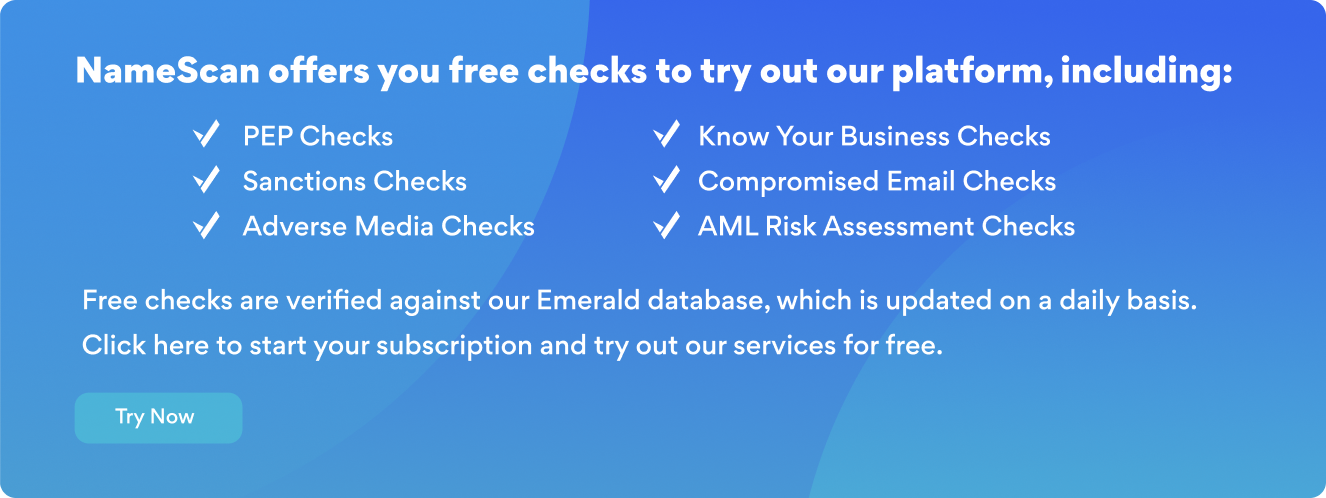In 2025, Anti-Money Laundering (AML) compliance has become more complex, making automated screening tools essential not only for large corporations but also for small and medium-sized enterprises (SMEs). As regulatory requirements tighten, SMEs must adopt efficient compliance strategies to mitigate financial and reputational risks.
Understanding Automated AML Screening
Automated AML screening uses advanced software to monitor financial transactions and customer data in real-time. These systems cross-reference information against global watchlists, including those for Politically Exposed Persons (PEPs), sanctioned entities, and individuals with adverse media. By automating the screening process, businesses can enhance compliance, reduce human errors, and respond to potential threats more effectively.
Key Benefits of Automated AML Screening for SMEs
1. Enhanced Efficiency and Accuracy
Manual AML compliance processes are time-consuming and prone to errors. Automated screening tools process large volumes of data quickly, significantly reducing the chances of missing red flags and ensuring a more accurate risk assessment.
Benefit: SMEs can allocate resources more efficiently and focus on core business activities.
2. Cost-Effective Compliance
Maintaining an in-house compliance team can be expensive for SMEs. Automated AML solutions minimise labour-intensive processes, reduce operational costs, and help businesses avoid hefty fines associated with non-compliance.
Benefit: Cost-effective compliance makes it easier for SMEs to meet regulatory requirements without overextending their budgets.
3. Real-Time Monitoring for Proactive Risk Management
The financial landscape is constantly evolving, with new threats emerging daily. Automated AML screening provides real-time monitoring, instantly flagging suspicious activities.
Benefit: SMEs can detect and address risks before they escalate, reducing exposure to financial crime.
4. Adaptability to Regulatory Changes
Regulatory requirements and sanctions lists frequently change due to geopolitical shifts and new threats. Automated screening tools update in real-time, ensuring that SMEs remain compliant without the burden of manual monitoring.
Benefit: Businesses avoid unknowingly engaging with sanctioned individuals or entities.
5. Improved Risk Management with AI-Assisted Insights
Modern AML tools leverage Artificial Intelligence (AI) and Machine Learning (ML) to identify suspicious patterns and anomalies that might be missed manually.
Benefit: Enhanced fraud detection and risk mitigation capabilities.
6. Scalability to Support Business Growth
As SMEs expand, so do their compliance requirements. Automated AML screening tools scale effortlessly, handling increased transaction volumes without compromising performance.
Benefit: Businesses can maintain compliance as they grow, avoiding bottlenecks in risk management processes.
7. Strengthened Business Reputation
Non-compliance with AML regulations can lead to severe penalties and reputational damage. By proactively implementing automated screening, SMEs demonstrate their commitment to regulatory standards, fostering trust among customers, partners, and regulators.
Benefit: Enhanced credibility and long-term business sustainability.
Conclusion
Automated AML screening tools are no longer a luxury but a necessity for SMEs in 2025. These solutions improve efficiency, reduce compliance costs, and ensure businesses remain compliant without disrupting operations. By adopting automated AML screening, SMEs can focus on growth while minimising financial and reputational risks.
Frequently Asked Questions (FAQs)
1. Why do SMEs need automated AML screening tools?
SMEs need automated AML screening tools to ensure compliance with evolving regulations, reduce human errors, and efficiently detect financial crimes. These tools help businesses stay compliant without the cost of extensive compliance teams.
2. Are automated AML screening tools cost-effective for SMEs?
Yes, automated AML screening tools reduce the need for large compliance teams, minimise operational costs, and prevent fines from regulatory violations, making them a cost-effective solution for SMEs.
3. How often do AML screening tools update their databases?
Most automated AML tools update their databases in real-time or at frequent intervals to ensure compliance with the latest regulatory changes and sanctions lists.
4. What should SMEs look for when choosing an AML screening tool?
SMEs should consider factors such as real-time monitoring, integration capabilities, ease of use, scalability, and regulatory compliance support when selecting an AML screening solution.
5. Can AML screening tools reduce false positives?
Yes, advanced AML solutions use risk-based approaches to refine screening results, reducing false positives and minimising unnecessary compliance burdens.
6. How do automated AML tools handle customer onboarding?
These tools streamline the Know Your Customer (KYC) process by verifying identities, checking against watchlists, and assessing risk levels in real-time, making onboarding faster and more secure.




0 Comments